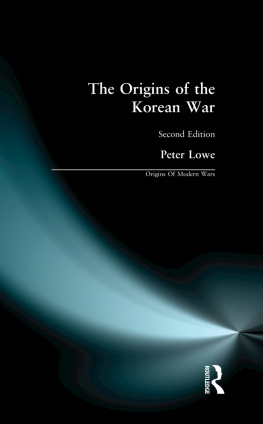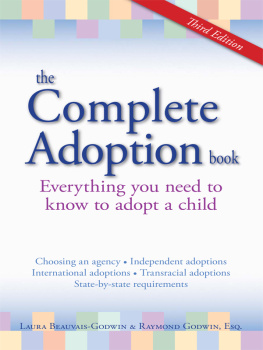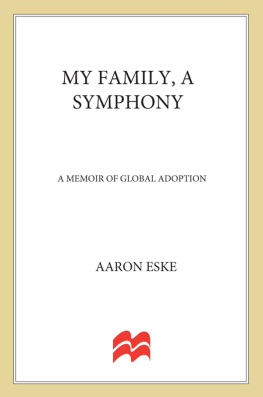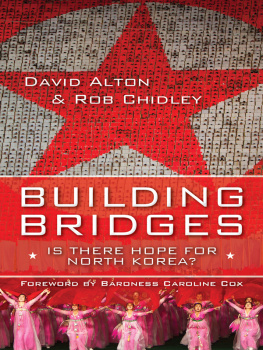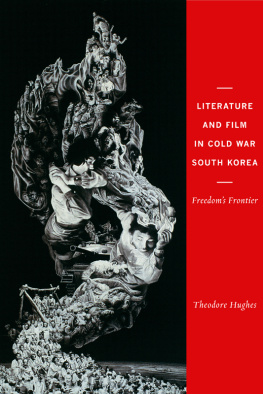Oh - To save the children of Korea the Cold War origins of international adoption
Here you can read online Oh - To save the children of Korea the Cold War origins of international adoption full text of the book (entire story) in english for free. Download pdf and epub, get meaning, cover and reviews about this ebook. City: Stanford;Südkorea;USA, year: 2015, publisher: Stanford University Press, genre: Politics. Description of the work, (preface) as well as reviews are available. Best literature library LitArk.com created for fans of good reading and offers a wide selection of genres:
Romance novel
Science fiction
Adventure
Detective
Science
History
Home and family
Prose
Art
Politics
Computer
Non-fiction
Religion
Business
Children
Humor
Choose a favorite category and find really read worthwhile books. Enjoy immersion in the world of imagination, feel the emotions of the characters or learn something new for yourself, make an fascinating discovery.

To save the children of Korea the Cold War origins of international adoption: summary, description and annotation
We offer to read an annotation, description, summary or preface (depends on what the author of the book "To save the children of Korea the Cold War origins of international adoption" wrote himself). If you haven't found the necessary information about the book — write in the comments, we will try to find it.
Oh: author's other books
Who wrote To save the children of Korea the Cold War origins of international adoption? Find out the surname, the name of the author of the book and a list of all author's works by series.
To save the children of Korea the Cold War origins of international adoption — read online for free the complete book (whole text) full work
Below is the text of the book, divided by pages. System saving the place of the last page read, allows you to conveniently read the book "To save the children of Korea the Cold War origins of international adoption" online for free, without having to search again every time where you left off. Put a bookmark, and you can go to the page where you finished reading at any time.
Font size:
Interval:
Bookmark:
ASIAN AMERICA
A series edited by Gordon H. Chang
The increasing size and diversity of the Asian American population, its growing significance in American society and culture, and the expanded appreciation, both popular and scholarly, of the importance of Asian Americans in the countrys present and pastall these developments have converged to stimulate wide interest in scholarly work on topics related to the Asian American experience. The general recognition of the pivotal role that race and ethnicity have played in American life, and in relations between the United States and other countries, has also fostered the heightened attention.
Although Asian Americans were a subject of serious inquiry in the late nineteenth and early twentieth centuries, they were subsequently ignored by the mainstream scholarly community for several decades. In recent years, however, this neglect has ended, with an increasing number of writers examining a good many aspects of Asian American life and culture. Moreover, many students of American society are recognizing that the study of issues related to Asian America speak to, and may be essential for, many current discussions on the part of the informed public and various scholarly communities.
The Stanford series on Asian America seeks to address these interests. The series will include works from the humanities and social sciences, including history, anthropology, political science, American studies, law, literary criticism, sociology and interdisciplinary and policy studies.
A full list of titles in the Asian America series can be found online at www.sup.org/asianamerica
To Save the Children of Korea
THE COLD WAR ORIGINS OF INTERNATIONAL ADOPTION
Arissa H. Oh
STANFORD UNIVERSITY PRESS
STANFORD, CALIFORNIA
Stanford University Press
Stanford, California
2015 by the Board of Trustees of the Leland Stanford Junior University. All rights reserved.
This publication was made possible by a subvention by the Trustees of Boston College.
No part of this book may be reproduced or transmitted in any form or by any means, electronic or mechanical, including photocopying and recording, or in any information storage or retrieval system without the prior written permission of Stanford University Press.
Printed in the United States of America on acid-free, archival-quality paper
Library of Congress Cataloging-in-Publication Data
Oh, Arissa H., author.
To save the children of Korea : the Cold War origins of international adoption / Arissa H. Oh.
pages cm (Asian America)
Includes bibliographical references and index.
ISBN 978-0-8047-9198-4 (cloth : alk. paper) ISBN 978-0-8047-9532-6 (pbk. : alk. paper)
1. Intercountry adoptionKorea (South)History20th century. 2. Intercountry adoptionUnited StatesHistory20th century. 3. Interracial adoptionUnited StatesHistory20th century. 4. United StatesArmed ForcesKorea (South)History20th century. 5. United StatesRelationsKorea (South). 6. Korea (South)RelationsUnited States. I. Title. II. Series: Asian America.
HV875.58.K6O3 2015
362.734095195dc23
2014042791
ISBN 978-0-8047-9533-3 (electronic)
Typeset by Newgen in 11/14 Garamond
For my parents
Jang Mibong & Oh Dong Chul
And for my halmunee
Kwak Eun Sun
They say the sky is so very high, but
I know something else that is higher still
The grace of my mother who gave birth to me and raised me
I think is higher than the blue sky
(A MOTHERS GRACE)
When we tell a story we exercise control, but in such a way as to leave a gap, an opening. It is a version, but never the final one. And perhaps we hope that the silences will be heard by someone else, and the story can continue, can be retold.
JEANETTE WINTERSON
Contents
Acknowledgments
Researching and writing this book has rarely been lonely because I have been blessed to be surrounded by generous, critical scholars to challenge me, and to cheer me on. Mae Ngai, Tom Holt, and Leora Auslander all provided valuable guidance and intervention as I conceived and developed this project. I owe Mae in particular an immense debt of gratitude for her ongoing mentorship. Many compatriots offered reliably skeptical feedback and important forms of support, related and unrelated to the life of the mind: Melissa Borja, Kornel Chang, Jessica Graham, Allyson Hobbs, Moira Hinderer, Molly Hudgens, Alison Lefkovitz, Jason McGraw, Meredith Oda, Sarah Potter, David Spatz, Michael Stamm, and Ellen Wu.
Financial support came from a number of sources: the University of Chicago (the Center for East Asian Studies Korean on Committee Studies and the Center for the Study of Race, Politics, and Culture), the Korean-American Scholarship Foundation, the Embassy of Korea in the USA, the Immigration and Ethnic History Society, the Organization of American Historians, the Association for Asian Studies, the University of Minnesota, the Doris G. Quinn Foundation, and the Department of Asian American Studies at the University of Illinois.
Thank you to the archivists and staff at the Social Welfare History Society at the University of Minnesota; the Center for Migration Studies; the Presbyterian Historical Society; the National Archives in College Park, MD, and Washington, DC; Yonsei University Library; and the National Assembly Library in Seoul. International Social Service and the Presbyterian Church (USA) granted me access to their records. George Drake kindly shared his personal collection of materials related to American servicemen and Korean children. In Korea, Myoung Yong Um and Ik Bae Kim provided important help, and Hyunjoo Lee was a fantastic research assistant.
Many people directly involved in Korean adoption took the time to share their thoughts and experiences with me, and my conversations with them have been enormously helpful. Thank you to Molly Holt and Hyun Sook Han, and to the many adoptees whom I formally interviewed or casually spoke with about my project. What they shared with me provided invaluable texture and background, and I have remained mindful of my responsibility to them and their stories as I have written this book. Thank you especially to Layne Fostervold and Katherine Kim, who helped a stranger crowdsource personal photos.
At Boston College I have received invaluable mentorship from Lynn Johnson and Kevin Kenny. My colleagues in the history department have been supportive and welcoming since day one, especially Jim Cronin, Devin Pendas, and Martin Summersand Julian Bourg, who always manages to make things more legible. I thank the senior women in particular for being such tremendous role models of scholarship and collegiality: Robin Fleming, Lynn Johnson, Deborah Levenson, Lynn Lyerly, Karen Miller, Rebecca Nedostup, Ginny Reinburg, Heather Richardson, Sarah Ross, Dana Sajdi, Sylvia Sellers-Garcia, and Franziska Seraphim. I am grateful to Julian Bourg, Lynn Johnson, Kevin Kenny, Tina Klein, Lynn Lyerly, and Sylvia Sellers-Garcia for engaging with my work, and for the camaraderie of Julie AhnAllen, Biz Bracher, Katie Dalton, Rgine Jean-Charles, Ramsey Liem, Pat DeLeeuw, and Min Song. There was nothing I asked for that superlibrarian Elliot Brandow and the interlibrary loan staff could not provide. A faculty fellowship and a week at the Intersections faculty writing retreat gave me the time and solitude I needed to complete the manuscript, and a research expenses grant helped me get this book across the finish line.
Beyond BC, many people have taken the time to talk with me about various aspects of this project over the years. Thank you to Karen Balcom, Carl Bon Tempo, Laura Briggs, Ariane Chernock, Kathy Conzen, Bruce Cumings, Sarah Park Dahlen, Kori Graves, Ellen Herman, Madeline Hsu, Taejin Hwang, Deann Borshay Liem, Steve Porter, Gina Miranda Samuels, Naoko Shibusawa, Allison Varzally, Judy Wu, and Tara Zahra. I presented parts of this book at the Massachusetts Historical Societys Boston Immigration and Urban History Seminar, the Society for Historians of American Foreign Relations, the Organization of American Historians, the Association of Asian American Studies, the Society for History of Childhood and Youth, the Berkshire Conference on the History of Women, and Brown University. I thank the audience and panelists at these meetings, especially Chris Cappozzola, Ellen Herman, Paul Kramer, Barbara Yngvesson, and Susan Zeiger, whose comments helped me develop my thinking in important ways. Eleana Kim most generously did an eleventh-hour reading and gave crucial feedback, and the anonymous reviewers for Stanford University Press also provided very helpful critique.
Next pageFont size:
Interval:
Bookmark:
Similar books «To save the children of Korea the Cold War origins of international adoption»
Look at similar books to To save the children of Korea the Cold War origins of international adoption. We have selected literature similar in name and meaning in the hope of providing readers with more options to find new, interesting, not yet read works.
Discussion, reviews of the book To save the children of Korea the Cold War origins of international adoption and just readers' own opinions. Leave your comments, write what you think about the work, its meaning or the main characters. Specify what exactly you liked and what you didn't like, and why you think so.

